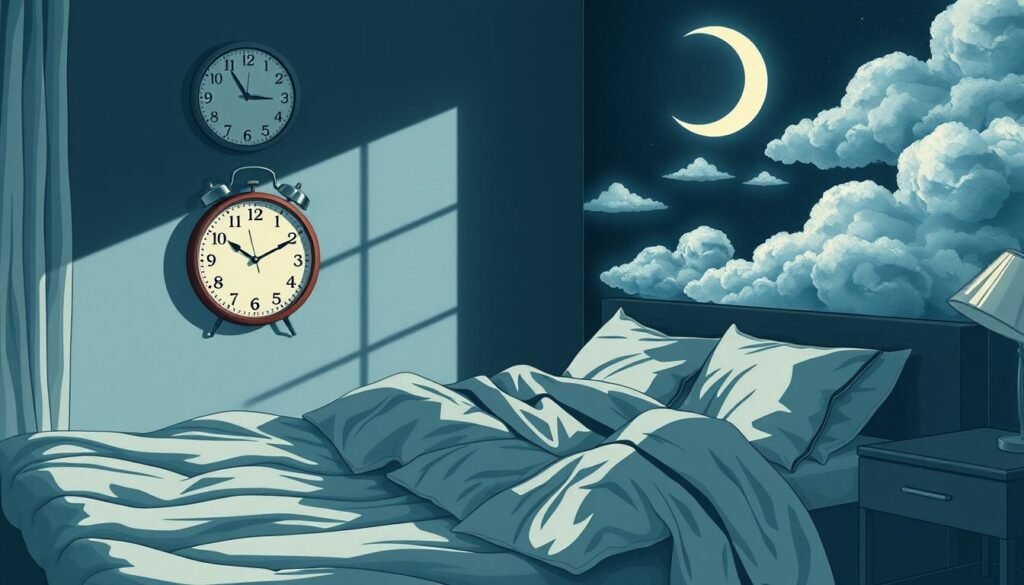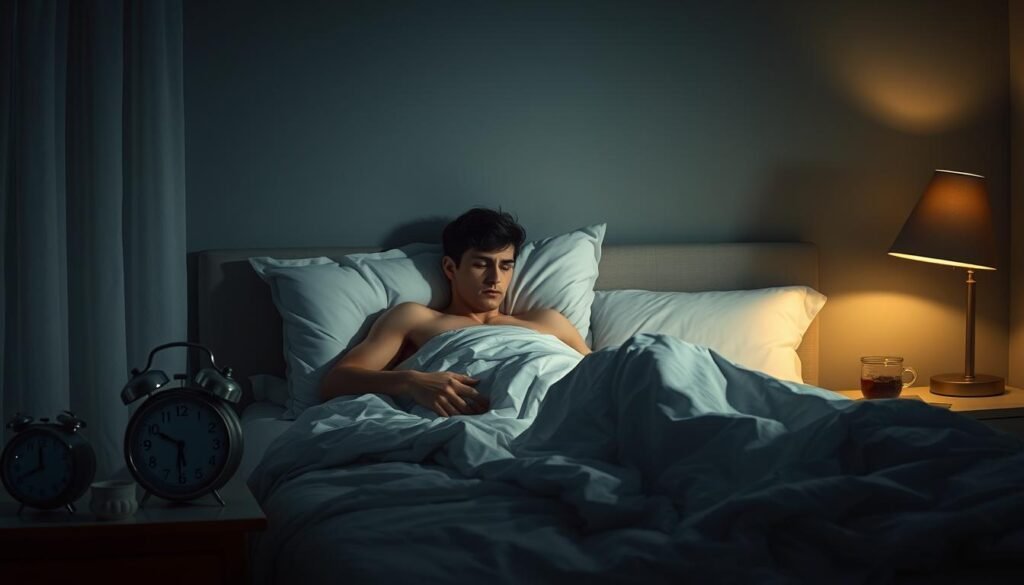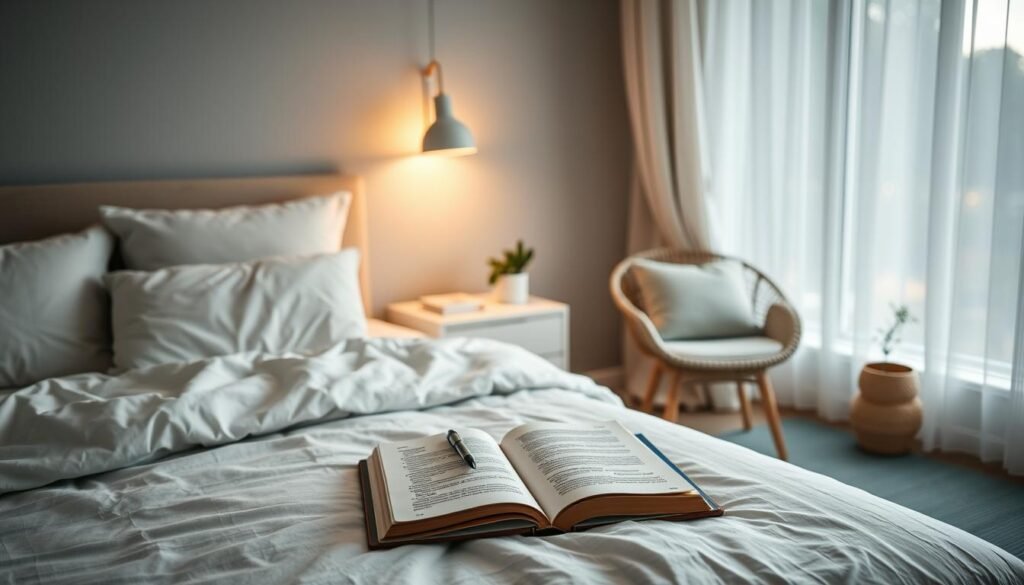Over 33% of women find sleep hard to come by during their menstrual cycles. This fact highlights the link between hormonal shifts and problems sleeping. Up to 90% of women battle premenstrual syndrome (PMS), seeing symptoms spike later in their cycle. This time is when hormones change the most. For those with PMS, the risk of insomnia jumps up. This shows a big need for effective causes and remedies for this widespread issue.
We will look closely at PMS-related insomnia, touching on causes, symptoms, and helpful remedies. It’s key to see how shifts in the hormone progesterone and changes in neurotransmitters like serotonin play out. They impact sleep a lot. Dealing with sleep problems during PMS is vital for feeling good overall during this period.
Key Takeaways
- PMS-related insomnia affects over 33% of women, making it a significant concern.
- Hormonal fluctuations play a crucial role in disrupting sleep patterns during the menstrual cycle.
- Up to 90% of women report symptoms related to PMS, particularly before menstruation.
- CONSULTATION with a healthcare professional is recommended before starting any treatment for PMS-related insomnia.
- Natural remedies, lifestyle changes, and medical interventions can all contribute to better sleep quality.
Understanding PMS and Its Impact on Sleep
Premenstrual syndrome (PMS) is common, affecting up to 90% of people who menstruate. These symptoms vary, from headaches and irritability to fatigue. Impact on sleep is significant during the luteal phase. This is the week right before menstruation starts. Studies show women with PMS have double the risk of insomnia.
The main cause of sleep problems is hormonal fluctuations. Levels of estrogen and progesterone change throughout the menstrual cycle. This affects sleep patterns. For instance, 70% of women with Premenstrual Dysphoric Disorder (PMDD) have trouble sleeping. This shows how hormonal changes can really impact sleep quality.
Night sweats are another issue caused by hormonal changes. This is due to shifts in progesterone and estrogen levels. These changes can make sleep difficult. For those with heavy periods, this problem is worse. They may need to wake up often to change pads or tampons.
In the late-luteal phase, serotonin levels drop. This can lead to anxiety and mood swings. About three out of four women experience insomnia because of PMS. Higher body temperatures at night can also make it hard to sleep. To help, try sticking to a sleep schedule, keep your bedroom cool, and avoid caffeine.
What is PMS-related Insomnia?
PMS-related insomnia is a sleep issue linked to premenstrual syndrome. People with this condition struggle to fall and stay asleep. This happens mainly during the late luteal phase of the menstrual cycle.
Studies show that up to 90% of women who menstruate face some PMS symptoms. About 3-8% may deal with a severe form called premenstrual dysphoric disorder (PMDD). Those suffering from PMS or PMDD often experience worse insomnia, poor sleep quality, and more daytime tiredness.
Hormonal changes during the menstrual cycle affect sleep patterns. In the luteal phase, there’s more light sleep and less REM sleep. Up to 70% of women with PMDD struggle with insomnia before their period. This makes sleep and mood problems more likely to happen.
Sleep issues usually spike 4-5 days before menstruation and carry on to the beginning of the period. This is often linked to hormones, like progesterone.
The relationship between melatonin and hormonal changes also affects sleep during PMS. Those with PMDD might make less melatonin and not respond to it well. Understanding the impact of PMS-related insomnia is important. It can disrupt daily life and overall health.
| Symptom | Description |
|---|---|
| Difficulty falling asleep | Struggling to initiate sleep, often extended periods of wakefulness. |
| Frequent awakenings | Waking up multiple times during the night. |
| Early awakening | Waking up earlier than desired and having trouble returning to sleep. |
| Daytime fatigue | Feeling tired or groggy during waking hours. |
| Poor concentration | Difficulty maintaining focus, often due to lack of sleep. |
| Mood changes | Experiencing increased irritability, anxiety, or symptoms of depression. |
Symptoms of PMS Insomnia
PMS insomnia affects sleep quality in different ways. It shows through:
- Difficulty falling asleep: Getting to sleep can be hard during some weeks.
- Frequent waking at night: Sleep might get interrupted, leaving a feeling of tiredness.
- Daytime fatigue: Feeling very tired during the day often comes from not sleeping well at night.
There are also physical signs like:
- Bloating
- Cramps
- Headaches
These physical problems can make it harder to sleep well. Mood changes also add to the problem. Feeling irritable, anxious, or down can start a tough cycle.
When dealing with these symptoms, women may find it tougher to sleep well. This can make them feel even more stressed.
Causes and Remedies: PMS-related Insomnia
Hormonal changes play a big part in PMS-related insomnia. When hormone levels go up and down before your period, it can mess with how well you sleep. This might make it hard to fall or stay asleep. Also, a rise in progesterone can make you warmer and mess with your sleep hormone, melatonin.

To treat PMS insomnia well, it’s key to know why it happens. Sleep issues often get worse in the luteal phase, which is the week or two before your period starts. Cramps and headaches, common with PMS, can make sleep even harder.
Trying some remedies for insomnia might ease the symptoms. Here are some tips:
- Keep a regular sleep schedule, going to bed and waking up at the same time each day.
- Track menstrual symptoms to spot patterns and triggers of insomnia.
- Do things that make you tired, like light workouts, earlier in the day.
- Think about using over-the-counter sleep aids or supplements like melatonin.
- Talk to doctors about hormone issues for more help.
Dealing with the causes of PMS insomnia by using these remedies can better your sleep before your period. Trying different methods may significantly help, ensuring restful nights.
For more tips on dealing with PMS and sleep, check out this detailed guide.
Hormonal Fluctuations and Sleep Disturbances
Hormonal changes greatly affect sleep, especially during the menstrual cycle. The late luteal phase brings changes that hurt sleep quality. Many women find insomnia to be a key issue during this phase.
Estrogen and progesterone levels rise, disrupting our sleep patterns. This makes it hard to fall asleep and stay asleep.
Insomnia affects many women, including those who are pregnant or postpartum. About 30% of pregnant women struggle with sleep. Meanwhile, 42% of postpartum women face similar challenges due to hormone shifts.
An imbalance in thyroid hormones may also cause sleep issues. Stress over time can upset hormonal balances, impacting sleep. As we get older, we make less melatonin, which increases insomnia in older adults.
It’s clear that hormones and sleep are deeply connected. Understanding this relationship helps us deal with sleep problems better.
To improve sleep, lifestyle changes and sleep hygiene are key. Keeping the bedroom cool, between 60 and 67 degrees, helps. Cognitive behavioral therapy (CBT) and melatonin supplements might also make falling asleep easier.
Physical Symptoms Contributing to Insomnia
PMS affects many women, causing physical symptoms that disrupt sleep. Issues like cramps and breast tenderness get worse before menstruation. This can make falling asleep hard and disturb your sleep.
Studies show many women say PMS issues affect their sleep quality. About 70% have sleep problems before their period starts. This leads to a cycle of sleep challenges, made worse by stress from discomfort.
Besides common symptoms, hormone changes also affect sleep during PMS. As progesterone levels go up, they bring mood changes and sleep problems. Relaxation techniques and good sleep habits can help manage these physical symptoms. They can improve your sleep quality.

Mood-Related Factors: Anxiety and Irritability
Mood factors like anxiety and irritability heavily influence PMS-related insomnia. Many women feel these symptoms more during their menstrual cycle’s luteal phase. This leads to higher anxiety levels, making sleep difficult.
This cycle means more anxiety can cause irritability and trouble sleeping, making PMS insomnia worse.
Research shows 5% to 10% of women suffer from Pre-Menstrual Dysphoric Disorder (PMDD). This affects their sleep a lot. These women may find it hard to tell their symptoms from other mood disorders.
Actually, about 40% of women getting help for PMDD might just have mood disorder symptoms that get worse before their period, not actual PMDD.
When women approach menopause, they may find mood disorders hit harder due to hormonal changes. They may feel emotionally numb, cry more, and get irritable easier. This can make living with PMS-related insomnia even tougher.
Women going through these changes often find their usual ways of coping don’t work as well. This makes them feel more upset and tired.
It’s important to understand the role of mood factors in managing PMS-related insomnia. Knowing how anxiety, irritability, and sleep problems connect can help find better treatments.
For serious cases, looking into mood management for PMS might help. You can find more information by visiting this link.
PMS-related Insomnia: Causes and Remedies
PMS-related insomnia affects many women. Over 33% report disturbed sleep during their menstrual cycles. Hormonal changes, especially the rise of progesterone after ovulation, play a big part. This increase can mess with how well and how long women sleep. Some even say they don’t get as much REM sleep in the late luteal phase. This can make it hard to focus and remember things.
The connection between PMS and sleep issues is clear. Studies show that women with severe PMS are more than twice as likely to have insomnia symptoms. During this time, changes in brain chemicals like serotonin and dopamine can really affect mood. This makes it even harder to sleep well.
Thankfully, there are ways to tackle these sleep problems. Making changes in daily habits, like what you eat and how you handle stress, can help a lot. If needed, talking to a doctor can lead to good advice on medicines and natural solutions too. For example, herbal remedies such as chasteberry have been found helpful for insomnia linked to PMS.
| Study | Findings |
|---|---|
| 2020 Randomized Controlled Trial | Myo-inositol supplements improved sleep quality and duration in pregnant women. |
| 2017 Study on Vitex | Chasteberry more effectively improved PMS-related symptoms compared to other remedies. |
| PCOS and Sleep Disturbance | Women with PCOS are prone to sleep problems due to hormone fluctuations and related symptoms. |
Evidence also shows that cognitive-behavioral therapy (CBT) is a good way to tackle PMS-related insomnia. It deals with psychological and physical aspects to make sleeping easier. This method helps create a better environment for sleep.
Natural Remedies for PMS Insomnia
Many women have trouble sleeping before their menstrual cycle starts. This is due to changes in hormones. Natural remedies that focus on relaxing, eating right, and using herbs can help. They improve how well we sleep.
Relaxation Techniques and Stress Management
Using ways to relax is key to handling stress and worry. These feelings often get worse before the menstrual period. Yoga and meditation can make you feel calm. This helps you sleep better. Adding some exercise can also help your body relax and improve your sleep.
Dietary Changes to Improve Sleep
Eating healthy helps keep your blood sugar levels even and supports hormones. This is important for good sleep. Foods like oatmeal, salmon, and veggies are good for you. They can help with PMS symptoms and make it easier to sleep. Taking vitamins like calcium and B-6 can also ease discomfort.
Herbal Supplements and Their Benefits
Herbs like valerian root and chamomile can help with sleep issues due to PMS. They have a soothing effect. Always talk to a healthcare provider before taking any herbs. This makes sure they are safe and right for you. Using these natural remedies can make your sleep better during your menstrual cycle.
Cognitive Behavioral Therapy and Medications
Cognitive Behavioral Therapy for Insomnia (CBT-I) is highly recommended for those with insomnia from PMS. It’s proven to effectively address sleep issues tied to hormone changes. The therapy uses cognitive methods to change sleep-blocking beliefs. It also uses behavioral techniques to build good sleep habits.
Using SSRIs and Hormonal Treatments
SSRIs and hormonal treatments help manage PMS-related insomnia. Though helpful, they can have side effects. It’s important to talk with a doctor about these options. This conversation can lead to a well-rounded treatment plan. It aims to significantly improve sleep quality.
Cognitive Behavioral Therapy for Insomnia (CBT-I)
CBT-I is one of the top solutions for insomnia. Studies show it helps many patients improve. The therapy usually takes 6 to 8 sessions. It promotes healthy sleep habits and reduces bad ones. Techniques like stimulus control and relaxation help make a sleep-friendly environment. This approach improves sleep in the short term and sets the groundwork for lasting sleep health.

Conclusion
Beating PMS-related insomnia needs a plan that looks at symptoms and remedies. Over a third of women have trouble sleeping during their period. This calls for solutions that help. Natural options like myo-inositol and Vitex can make sleep better and lessen PMS. Changes in how we live are key. They help us make our sleep better and manage stress.
It’s key to remember that PMS touches more than 90% of women before their period. This happens because hormone levels change. These changes can mess with melatonin and reduce REM sleep. REM sleep is vital for feeling rested. Making smart choices, reducing stress, and seeking advice from doctors can improve well-being during this time.
In the end, knowledge and smart remedies help women deal with PMS-related insomnia better. Paying attention to changes in lifestyle is crucial. It helps adjust daily habits to relax more and sleep without interruption. This leads to a healthier, more balanced life.